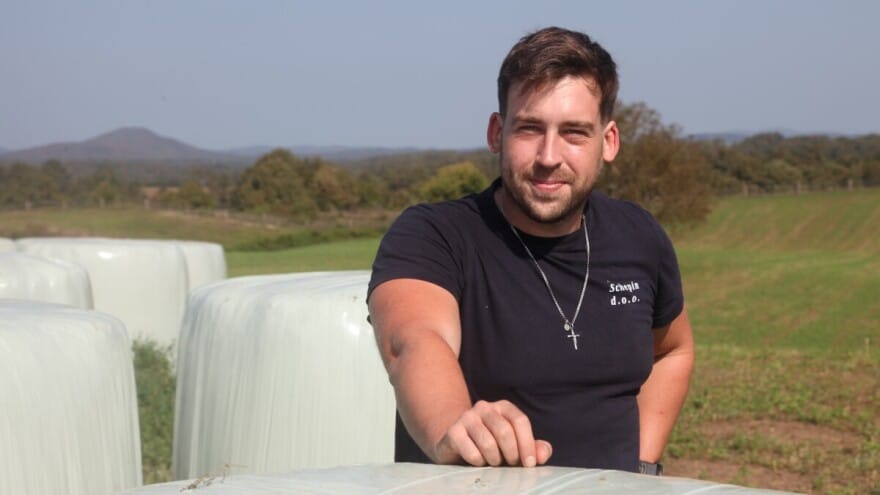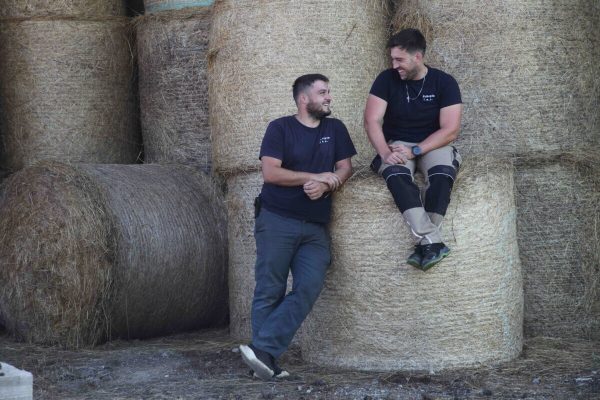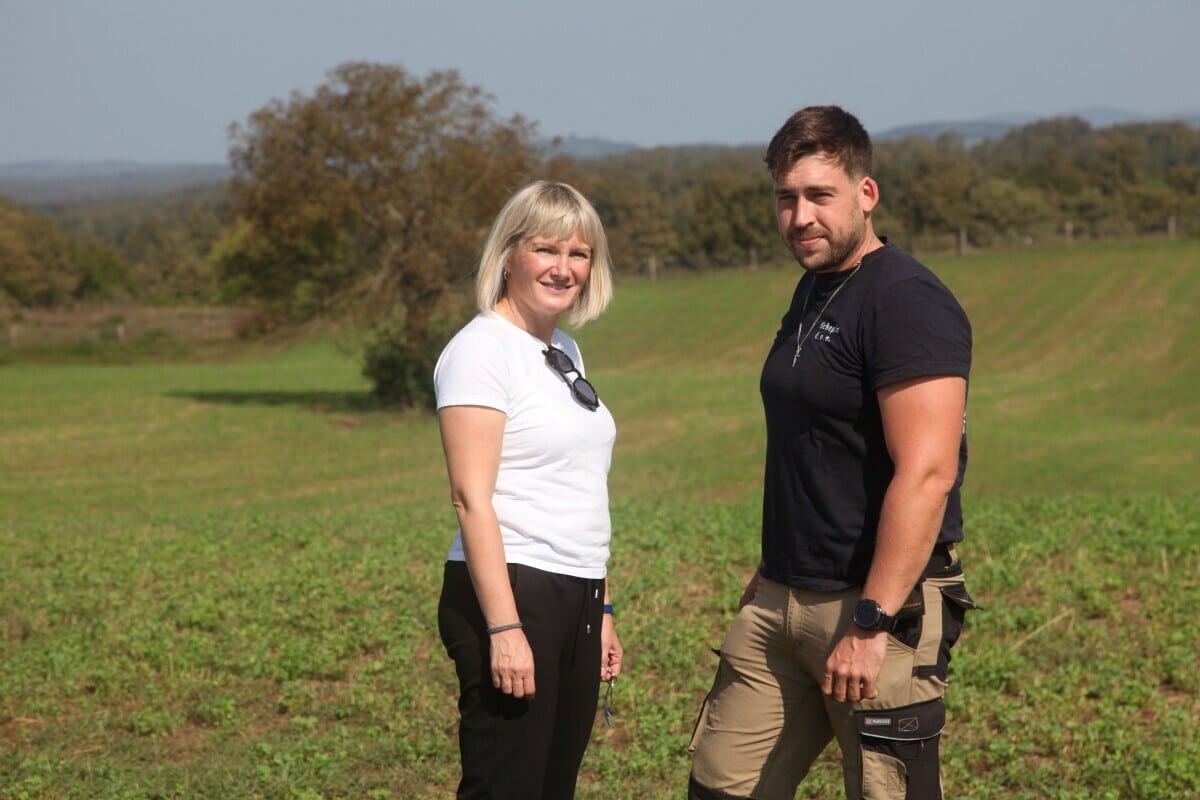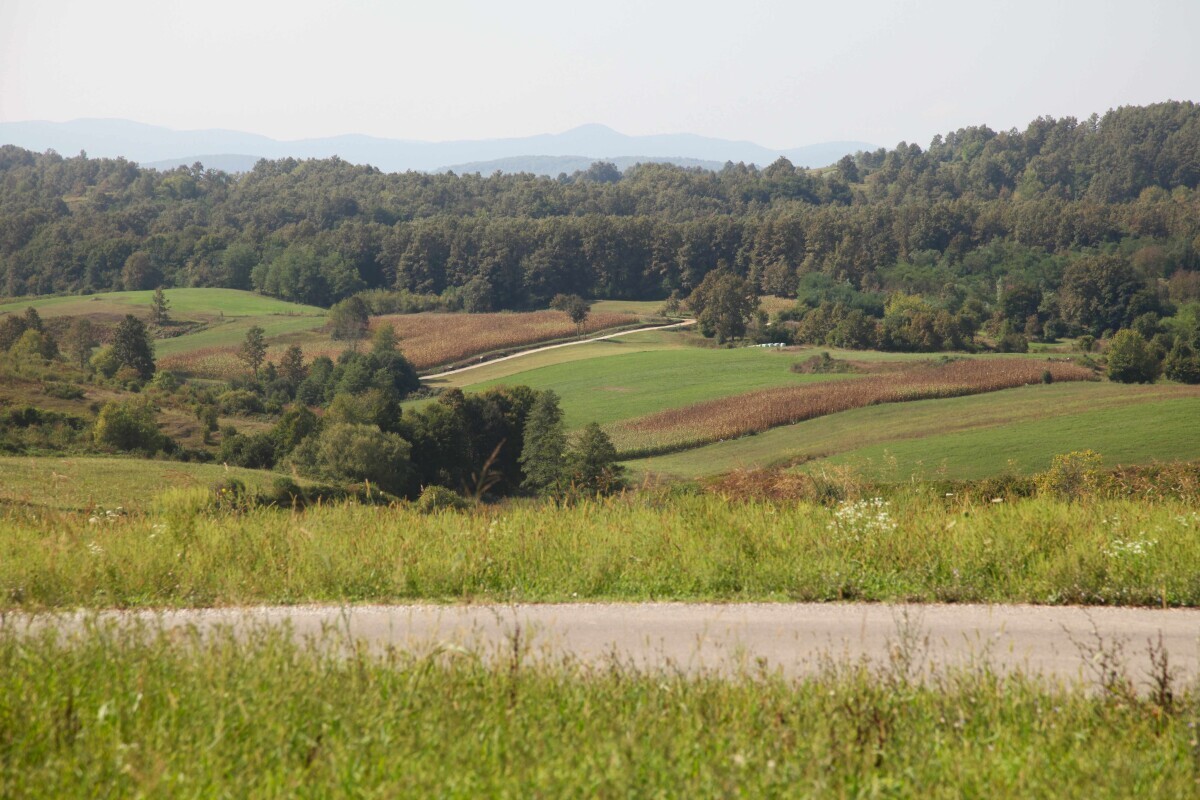Dorian Obrovac is creating conditions for organic livestock farming on 330 hectares of land, while exporting hay to Kuwait. Here’s what else he does and how he combats acidic soil.

Above the picturesque village of Rastoke, on the way to the Adriatic Sea, lies the small village of Glinsko Vrelo. It consists of just eight houses, three of which are permanently inhabited. This is where Dorian Obrovac (30), a young entrepreneur, is building his home while making a living from agriculture and forestry.
Dorian is the owner of Schepin, a company with an international name chosen to reflect his export ambitions. He aims to export his organic hay to the Middle East.
“I’ve always been good at geography. Down in those countries, everything is yellow, and I figured they must lack hay—so I started researching,” said Dorian, echoing the saying: “If you’re looking for opportunities, you’ll find them; if you’re not, you’ll never see them.”
The name of his company, however, stems from a piece of classic rural humor.
“My great-grandfather worked on railroads in America during Wyatt Earp’s time. He lost a leg there, and when he returned home with a wooden leg, they called him ‘Šepin’ (a limping man). So I decided to name my company Schepin, to make it easier for foreigners to pronounce,” Dorian explained with a smile.
This young man grew up in the countryside and has been working since he was a child. He paid for his education himself, completed university, and earned a degree in hospitality.
“I was a lively child. I carried wheelbarrows on my shoulders, bent aluminum wires, and drove tractors—my grandma never had a moment’s peace with me,” he recalled.
His family used to raise livestock and sell the meat at their restaurant, Feniks, which is popular among travelers taking the old road to the Adriatic.
The COVID-19 pandemic prompted them to diversify their focus. Instead of relying solely on tourism, they decided to develop agriculture and fully utilize the potential of their land.
“First, we need to create conditions for proper livestock production. Otherwise, the animals control you, not the other way around,” said Obrovac, who plans to raise Simmental cattle for beef production.
Fear of Bears
Dorian owns 330 hectares of land, which he is gradually cultivating, clearing, and mulching. His farm is currently home to about 40 horses and donkeys, along with a small flock of ten sheep—relatively modest numbers considering the vast land he has available.
The main concern, however, is the presence of bears in the area.

“First, we’ll restore the land and put it into proper use. Second comes equipping ourselves with machinery, and only then will we focus on tourism. We learned our lesson during the pandemic when we had to shut down our restaurant… but we survived,” says this determined farmer.
They’ve built fencing to protect against wolves, which aren’t much of an issue since they don’t roam in packs in the area. However, their biggest fear remains the bears.
Dorian has assembled a young team of enthusiasts. Alongside his sister Dorotea Pavlić and friend Mario Špelić, they’ve hired two full-time workers from Bosnia and Herzegovina, with plans to bring in two more.
“We focus on agriculture during the summer and forestry in the winter, so we’re looking for workers who can stay with us year-round. We offer mulching services, land clearing, biomass production, and planting while preparing habitats for forest cultivation in cooperation with Hrvatske šume (Croatian Forests),” Dorian explains.
He works closely with colleagues from nearby farms, maintaining strong bonds and mutual support. Some of his collaborators include Oliver Turkalj, Darko Obrovac, Davor and Dalibor Jozić, and Nikola Radočaj. They know they can rely on each other and are always on the lookout for skilled professionals who can help improve their operations.
“My colleague Oliver, who runs a farm with 200 dairy cows in Veljun, once told me the worst mistake in agriculture is listening to older people’s advice. And I took his advice,” Dorian shared with a laugh.

Changed Soil Treatment Method and Doesn’t Regret It
It was a fellow livestock farmer who introduced Dorian to Marijana Šutej, an expert advisor from Timac Agro. She helped him change the way he treats and fertilizes the soil, leading to increased production.
“When I first came here, I met a young person who knew something needed to change. He understood that it had to be profitable and of high quality, and that it wouldn’t happen by itself,” said Marijana Šutej as we toured the alfalfa fields.
The soil here is highly acidic, and Dorian used to order a 25-kilogram bag of NPK 3×15— and that was it. But he soon realized that this approach wasn’t making sense.
“Phosphorus was blocked here due to the acidic soil, with a pH between 4 and 5, which was a limiting factor. There’s enough organic matter, but the decomposition and microbial activity were weak,” explained Marijana, who has been helping him improve soil fertility. Through calcification, they’ve encouraged better structure, water-air balance, and nutrient availability.
When she first visited the farm, Dorian didn’t have any cereal or protein crops—just pastures. They discussed switching to targeted and organic solutions that would enable better yields.
Today, they produce 700 tons of hay (28 bales per hectare), which is a 30% increase compared to before using Timac Agro fertilizers. The production is now more stable and resistant to weather changes, say the experts.

Dorian Uses Physio Mescal G18 for the Third Year in a Row
Dorian has been using Physio Mescal G18 for the third consecutive year. This product, a sea-derived calcareous material enriched with 18% P2O5, sulfur, magnesium, and amino purines extracted from seaweed, has a biostimulatory effect on root development.
“The advantage of this calcium is its porosity, fast solubility, and reactivity. It’s quickly available to the plant and raises the pH in a rapid and sustainable way,” says this advisor. The application has resulted in accelerated growth and grass regeneration after mowing, better resistance to trampling, and a denser stand.
This year, they applied the biostimulant Vigor NK on cereals grown on manure to encourage quicker nutrient uptake from the soil and maintain plant vitality with amino acids from the product. The treatment was applied when they noticed development stagnation due to abiotic stress, particularly excess moisture.
This autumn, they plan to use Physio Natur PKS 41 for alfalfa sowing. This product is rich in calcium (30%), but also contains 13% P2O5, 15% K2O, sulfur, and magnesium. The potassium is in the form of potassium sulfate.
“We decided to apply it because alfalfa is a perennial crop that, through frequent mowing, extracts both potassium and calcium from the soil,” concludes Marijana.
After Five Years of Waiting, Finally Acquired the Equipment
Out of 330 hectares of land, 70 are in the direct payment system, Dorian mentions.
He wasn’t pleased when, like many other farmers, he was unfairly denied support for areas with natural limitations last year, as Slunj was inexplicably removed from the list.
“It’s as if the stone disappeared, but it didn’t. Our farmers still have problems here and need 30% stronger machinery and tractors. Without double traction, we can’t do anything here,” says this farmer.
They applied for the 8.6.1. operation and passed, but they waited five years for the contract. Now, they only have one year to complete their investment.
They bought machinery capable of clearing the land and providing such services to others.
“It’s really difficult to get funding; the system isn’t well set up, and with just one click, you’re either going to get support or not. I don’t look at myself; we got the funds, but other people, if they don’t have the knowledge, can’t do anything. They pay consultants and end up way below the line, when they could’ve bought a cow and invested in fertilizers,” says this young entrepreneur.
In the surrounding area, agricultural land is sold for 3,000 euros per hectare. Dorian believes it’s not cheap because a lot still needs to be invested in the land. After the lifting of the moratorium on foreign land purchases, prices doubled, says our interlocutor.
A Gamble to Do Business in Croatia
Dorian is aware of the good geostrategic position near Slunj, which he says is “two hours away from everything—Zagreb, Zadar, Rijeka…”
He sees this as an advantage over the competition because they are closer to Dalmatia and Istria than Slavonia.
“Our hay is cheaper than that brought in from Slavonia. Our bales are 300 kg, so a truck can carry 4 tons more,” says Obrovac.
They have domestic customers, but they’re increasingly turning to foreign trade and the so-called GCC countries—Arab nations in the Persian Gulf.
“It’s a gamble to do business on our market. We could ship hay, but they’d return it because they found cheaper alternatives. But in winter, when things get tight, they’re ready to pay any price. Instead of agreeing on a contract with a fair price and timing, so everyone is satisfied,” says Dorian, highlighting that in Croatia “there’s no business seriousness.”
He believes they can be competitive in terms of quality and transport.
“Other countries have large needs for hay, and we are nearby. Their goods come from America, which makes a big difference in nautical miles compared to Croatia,” he adds.
They sent their first shipment of hay to Kuwait, and the customers were very satisfied. The only problem is the uncertain situation with pirates in the Suez Canal, which has doubled shipping rates.
But this hasn’t discouraged the young entrepreneur. He wants to work and live in Kordun and is building a house for his future family. He doesn’t see prosperity in the city. He believes this is the best place to raise children because “in the city, they’re only on their phones.”
“There’s space here for serious agriculture, and I think that’s what this area needs. Agriculture isn’t for everyone, but nothing is hard for us,” concluded the fearless Dorian Obrovac, joking that “if my great-grandfather rose from his grave, he’d fall back in immediately when he saw what we’ve done here.”

Author: Leticija Hrenković
https://www.agroklub.com/korisnici/leticija-30346/tekstovi/
https://www.agroklub.com/eko-proizvodnja/mladi-ekolog-s-korduna-zasto-je-vrijeme-za-nove-pristupe-u-poljoprivredi/98447/
Photos: Agroklub
